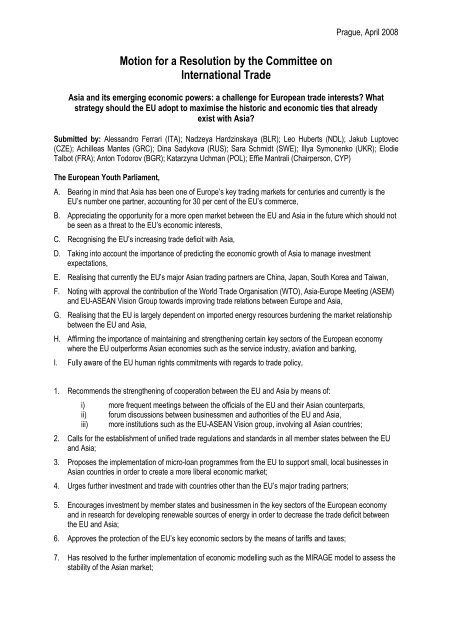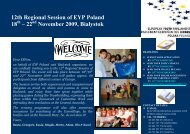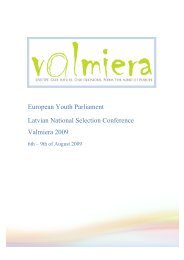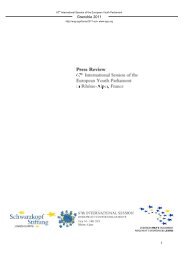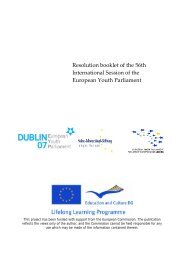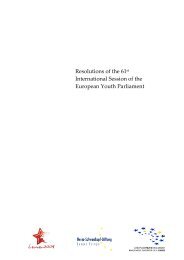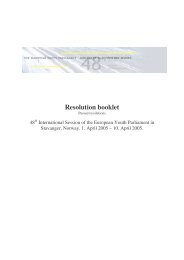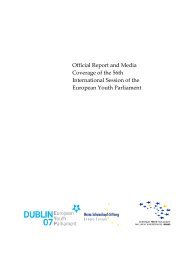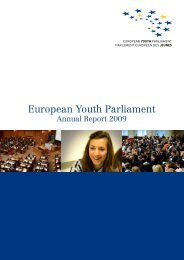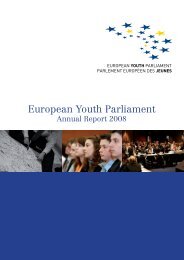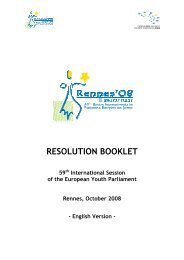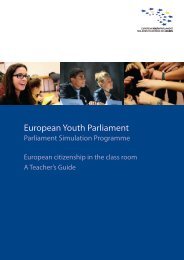Resolution - European Youth Parliament
Resolution - European Youth Parliament
Resolution - European Youth Parliament
You also want an ePaper? Increase the reach of your titles
YUMPU automatically turns print PDFs into web optimized ePapers that Google loves.
Motion for a <strong>Resolution</strong> by the Committee on<br />
International Trade<br />
Prague, April 2008<br />
Asia and its emerging economic powers: a challenge for <strong>European</strong> trade interests? What<br />
strategy should the EU adopt to maximise the historic and economic ties that already<br />
exist with Asia?<br />
Submitted by: Alessandro Ferrari (ITA); Nadzeya Hardzinskaya (BLR); Leo Huberts (NDL); Jakub Luptovec<br />
(CZE); Achilleas Mantes (GRC); Dina Sadykova (RUS); Sara Schmidt (SWE); Illya Symonenko (UKR); Elodie<br />
Talbot (FRA); Anton Todorov (BGR); Katarzyna Uchman (POL); Effie Mantrali (Chairperson, CYP)<br />
The <strong>European</strong> <strong>Youth</strong> <strong>Parliament</strong>,<br />
A. Bearing in mind that Asia has been one of Europe’s key trading markets for centuries and currently is the<br />
EU’s number one partner, accounting for 30 per cent of the EU’s commerce,<br />
B. Appreciating the opportunity for a more open market between the EU and Asia in the future which should not<br />
be seen as a threat to the EU’s economic interests,<br />
C. Recognising the EU’s increasing trade deficit with Asia,<br />
D. Taking into account the importance of predicting the economic growth of Asia to manage investment<br />
expectations,<br />
E. Realising that currently the EU’s major Asian trading partners are China, Japan, South Korea and Taiwan,<br />
F. Noting with approval the contribution of the World Trade Organisation (WTO), Asia-Europe Meeting (ASEM)<br />
and EU-ASEAN Vision Group towards improving trade relations between Europe and Asia,<br />
G. Realising that the EU is largely dependent on imported energy resources burdening the market relationship<br />
between the EU and Asia,<br />
H. Affirming the importance of maintaining and strengthening certain key sectors of the <strong>European</strong> economy<br />
where the EU outperforms Asian economies such as the service industry, aviation and banking,<br />
I. Fully aware of the EU human rights commitments with regards to trade policy,<br />
1. Recommends the strengthening of cooperation between the EU and Asia by means of:<br />
i) more frequent meetings between the officials of the EU and their Asian counterparts,<br />
ii) forum discussions between businessmen and authorities of the EU and Asia,<br />
iii) more institutions such as the EU-ASEAN Vision group, involving all Asian countries;<br />
2. Calls for the establishment of unified trade regulations and standards in all member states between the EU<br />
and Asia;<br />
3. Proposes the implementation of micro-loan programmes from the EU to support small, local businesses in<br />
Asian countries in order to create a more liberal economic market;<br />
4. Urges further investment and trade with countries other than the EU’s major trading partners;<br />
5. Encourages investment by member states and businessmen in the key sectors of the <strong>European</strong> economy<br />
and in research for developing renewable sources of energy in order to decrease the trade deficit between<br />
the EU and Asia;<br />
6. Approves the protection of the EU’s key economic sectors by the means of tariffs and taxes;<br />
7. Has resolved to the further implementation of economic modelling such as the MIRAGE model to assess the<br />
stability of the Asian market;


